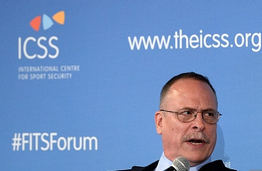By Paul Nicholson at the FITS Forum in Geneva
September 4 – There is an urgent need for regulation to make football clubs identify who their owners are, including beneficial owners – the real owners hiding behind shell companies or nominees, said Nicola Bonucci, director legal of the OECD.
The ban on third-party ownership has seen an increase in club ownership by wealthy off-shore companies and agents. There is often very little transparency and the vulnerability of club ownership rules mean that criminal infiltration has been easy and quick, and is an increasing danger.
Speaking at the FITS Forum (financial integrity and transparency in sport) in Geneva, Bonucci said that governance regulating the ownership of football clubs has not evolved at the same pace as the investors coming into clubs.
“Consider this. Football more than any sport is a business; it isn’t any kind of business; clubs are privately owned but not transparently run. Transport this to the commercial sector. They are privately owned, not profitable and with little governance,” he said.
“Fans are conflicted. They want to be number one at all costs so don’t care about governance. The corporate objective is to be number one. Would you trust any corporate sector with those aspirations.”
Bonucci said that “there needs to be full disclosure of public ownership including beneficial ownership. This should be part of international law. Who is the person behind all the different structures? Who is the person who is controlling?”
Speaking on the same panel Claudius Shafer, CEO of the Swiss football league, gave the example of Neuchatel that was bought by a Chechen businessman who ran into trouble leaving the club to go bust and the league with nine teams to finish its season. Shafer questioned whether there was anything the club could have done prior to the purchase.
Chris Eaton (pictured), executive director of sport integrity ICSS, said that this was all too common and in this case it happened in a sophisticated jurisdicition. “It is time for these organisations to grow up,” said Eaton. “They need to get the due diligence like the banks do.”
“Organised crime is deep in sport so you must have deeply surgical solutions. This is not about reform, it is about rebuilding,” said Eaton.
Contact the writer of this story at moc.l1736600595labto1736600595ofdlr1736600595owedi1736600595sni@n1736600595osloh1736600595cin.l1736600595uap1736600595

